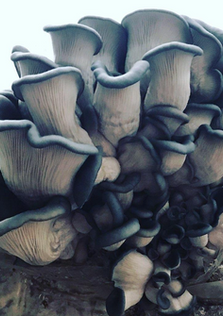
Oyster Mushrooms: Nature’s Healer and Environmental Ally
Celebrated as one of the most powerful superfoods in the fungal kingdom, Oyster mushrooms (Pleurotus ostreatus) offer a rare combination of potent nutrition, medicinal compounds, and culinary versatility. Their nutrient density and bioactive components make them an exceptional addition to both everyday diets and functional wellness routines.

But what exactly makes these mushrooms so remarkable? From immune support and antioxidant power to cholesterol management and anti-inflammatory effects, Oyster mushrooms deliver a wide spectrum of health benefits backed by science and tradition alike.
🧠 Mood and Relaxation
Oyster mushrooms may help promote relaxation and improve mood. This is partly due to their high levels of vitamin B6, a nutrient essential for neurotransmitter function and mood regulation. Incorporating these mushrooms into your diet could offer a natural boost in your daily mental balance.
💖 Cholesterol Control
One of the standout compounds in oyster mushrooms is lovastatin, a naturally occurring statin that helps lower cholesterol levels. Regular consumption may contribute to improved heart health by managing LDL ("bad") cholesterol and supporting overall cardiovascular function.
💪 Immune Support and Anti-Cancer Potential
These mushrooms are rich in beta-glucans, powerful polysaccharides known for their immunomodulating properties. Beta-glucans help enhance the body's immune defenses and are currently being studied for their role in fighting certain types of cancer. Their ability to activate immune cells makes them a potential ally in immune-related therapies.
✨ Skin and Vitality
Thanks to their impressive levels of iron, zinc, and B vitamins, oyster mushrooms may also support skin health, boost collagen production, and promote a more youthful appearance. The protein content adds to their appeal as a nutrient-dense plant-based option for vegetarians and health-conscious eaters.
🌍 An Environmental Powerhouse
While oyster mushrooms work wonders in the body, they’re equally incredible when it comes to healing the Earth.
🧪 Bioremediation Wonders
Oyster mushrooms have a remarkable ability to break down environmental pollutants, including diesel fuel, gasoline, plastics, oils, and even polychlorinated biphenyls (PCBs)—some of the most stubborn and dangerous pollutants.
The secret lies in their mycelium, the root-like fungal network beneath the mushroom. When this mycelium is spread over contaminated soil, it begins to absorb and degrade toxic compounds, transforming previously polluted areas into revitalized, clean environments. This process, known as mycoremediation, is a promising frontier in ecological restoration.
💡 Fun Fact:
Scientists and environmentalists are actively exploring how oyster mushrooms might be deployed to clean up oil spills—an exciting and sustainable alternative to chemical methods that often come with their own hazards.
🍽️ From Plate to Planet
Whether sautéed into a stir-fry or infused into supplements, oyster mushrooms provide a unique combination of nutritional richness and planet-healing power. They're a shining example of how something as humble as a mushroom can contribute to personal health and planetary recovery.
Next time you see an oyster mushroom at the farmers’ market or grocery store, think beyond its mild flavor and velvety texture. You’re looking at a natural medicine, a mood-lifter, and a silent hero in the fight against pollution.
Explore. Eat. Empower.
Let oyster mushrooms be a part of your wellness routine—and maybe, just maybe, the planet’s too.

📖 References
USDA FoodData Central. Oyster Mushroom, raw (FDC ID 169989).
Kennedy DO. B Vitamins and the Brain: Mechanisms, Dose and Efficacy—A Review. Nutrients. 2016;8(2):68.
Gunde-Cimerman N, et al. Pleurotus mushrooms contain lovastatin and have hypocholesterolemic potential. Mycological Research. 1993;97(6):755–757.
Bobek P, Galbavý S. Hypocholesterolemic effect of oyster mushroom (Pleurotus ostreatus) in rats fed cholesterol diet. Nutrition Research. 1999;19(4):427–431.
Wasser SP. Medicinal mushrooms as a source of antitumor and immunomodulating polysaccharides. Appl Microbiol Biotechnol. 2002;60:258–274.
Jedinak A, Sliva D. Pleurotus ostreatus inhibits proliferation of human breast and colon cancer cells through p53-dependent as well as p53-independent pathway. Int J Oncol. 2008;33(6):1307–1313.
Kalaras MD, Richie JP, Calcagnotto A, Beelman RB. Mushrooms: a rich source of the antioxidants ergothioneine and glutathione. Food Chem. 2017;233:429–433.
USDA FoodData Central. Micronutrient breakdown of Pleurotus ostreatus.
Pointing SB. Feasibility of bioremediation by white-rot fungi. Appl Microbiol Biotechnol. 2001;57:20–33.
Eggen T, et al. Potential of white-rot fungi to degrade organic pollutants in sewage sludge. Appl Microbiol Biotechnol. 2003;57:360–365.
Stamets P. Mycelium Running: How Mushrooms Can Help Save the World. Ten Speed Press, 2005.
Stamets P. A novel approach to bioremediation: oyster mushrooms and petroleum waste. Presented at American Academy of Microbiology, 2000.
Cohen N, et al. Biodegradation of oil by Pleurotus ostreatus in soil microcosms. World J Microbiol Biotechnol. 2002;18:559–563.
I'm a paragraph. Click here to add your own text and edit me. It's easy.



